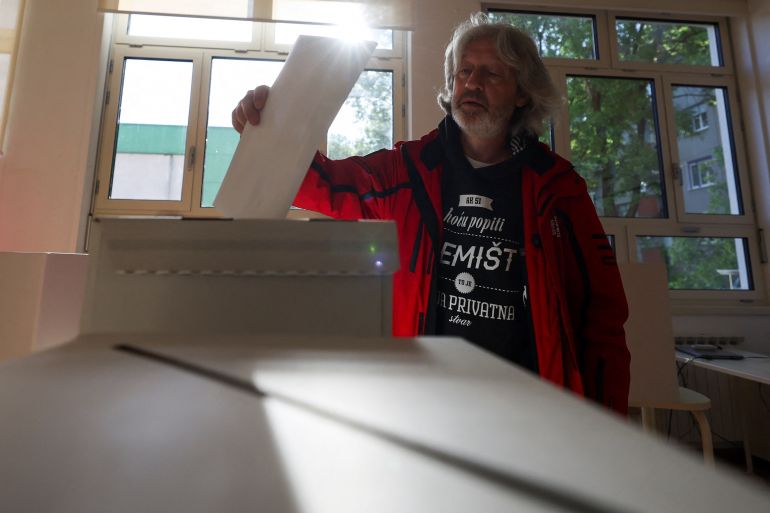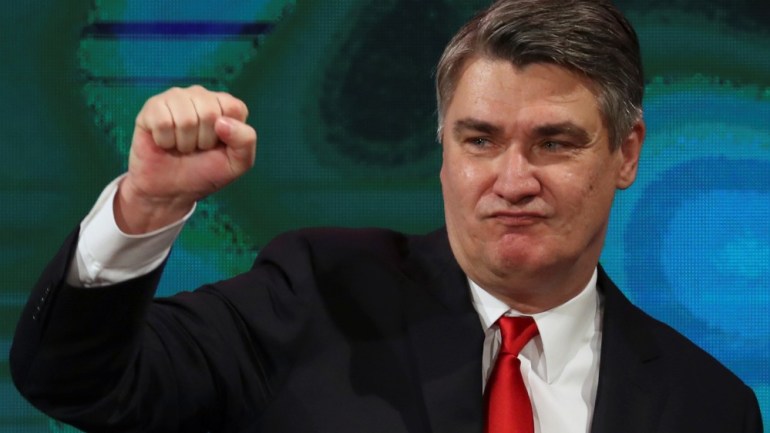Croatians vote in election pitting PM Plenkovic against President Milanovic
Exit polls expected minutes after voting ends at 7pm (17:00 GMT), with official results due in the coming days.

Croatians are casting ballots in a parliamentary election largely pitting incumbent Prime Minister Andrej Plenkovic against the country’s president, Zoran Milanovic.
Voters will choose between more than 2,000 candidates in Wednesday’s polls that come as the country wrestles with high inflation, a labour shortage and allegations of official corruption.
Keep reading
list of 4 itemsTogo’s parliamentary election: Why all eyes are on President Gnassingbe
Has South Africa’s ANC failed to live up to its promises?
April 27, 1994: What has changed in South Africa 30 years after apartheid?
Exit polls are expected minutes after voting ends at 7pm (17:00 GMT), with official results due in the coming days.
For months, 54-year-old Plenkovic and his ruling conservative Croatian Democratic Union (HDZ) seemed poised for an easy victory that would secure his third term as prime minister.
But in mid-March, Milanovic, a 57-year-old populist, made the surprise announcement that he would challenge Plenkovic and become candidate prime minister for the Social Democrats (SDP).
However, the Constitutional Court warned Milanovic that his candidacy while he is president is incompatible with his official position.
The president holds a largely ceremonial role in Croatia, while the prime minister exerts most of the political power. Milanovic’s mandate expires in January but he said he would step down if the SDP and its allies secure a majority to form a new government.
Pre-election polls suggested that the HDZ would win most seats in the 151-seat parliament, but not enough to secure an outright majority. Coalition talks are expected to follow the vote.
The streets of Zagreb were quiet as voters lined up to cast their ballots on a national holiday.
“We would like to see politicians work in the interest of the people; that is what we elect them for. Nothing like in the past 30 years,” pensioner Biserka Kolaric, who voted in the capital, told Reuters.
Fears of weakening EU’s unity on Ukraine
The HDZ has largely held power since Croatia gained independence from the former Yugoslavia in 1991.
If it stays in power, the country would continue a pro-Western course in supporting Ukraine in its fight against Russia. A success for SDP could put it on track for victory in the European Parliament elections in June and the presidential election in December.
Plenkovic has lambasted Milanovic over his criticism of EU backing for Ukraine against Russia’s invasion and the president’s opposition to training Ukrainian soldiers in Croatia.
“Milanovic is pushing Croatia and the Croatian people into the Russian world,” Plenkovic told supporters during a pre-election rally.
The president has argued that he is protecting Croatian interests and seeks to prevent the country being “dragged into war”.
“My character is not easy, but I will not remain silent,” he wrote in a recent Facebook post and pledged to “form a national salvation government”.

Corruption accusations
The president has also accused Plenkovic and the HDZ of rampant corruption and “massive theft” of state funds, referring to past and present scandals, some of which had ended up in the courts.
Several ministers from the party have stepped down amid corruption allegations. One acting minister was arrested.
“Croatia has never had such a corrupt government,” Milanovic said in his final address ahead of the vote.
Plenkovic, who has led the government since 2016, has repeatedly denied the accusations. He has also accused his rival of violating the constitution, making hate speech and called him a “coward” for not resigning to contest the polls.
The prime minister has been highlighting his role in guiding the country of 3.8 million people into the eurozone and Europe’s passport-free Schengen area last year.
But with an average monthly wage of 1,240 euros ($1,345), the country remains one of the European Union’s poorest.